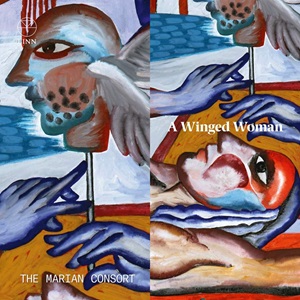
A Winged Woman
The Marian Consort/Rory McCleery
rec. 2022, All Hallows’ Gospel Oak, UK
Linn CKD724 [70]
As well as championing historic and often neglected repertoire, the Marian Consort have made a particular effort to perform to premiere new compositions. This album is a culmination of this work: a superb and diverse collection of works by mostly living (and younger) British composers. Nearly all set to Marian texts, these pieces prove that, for all the spiritual, cultural and institutional crises that seem to engulf the Christian churches, there is still much hope for sacred choral music.
All the works are for unaccompanied choir. There is great diversity – we hear this right from the beginning. The layered polyphony of Electra Perivolaris’s A Winged Woman is followed by the texturally simple Prayer to the Mother of God by Oliver Tarney. Both have much to recommend them. A Winged Woman is a setting of two texts – by Heather Dohollau and Hildegard of Bingen – and uses a rich and individual harmonic language. Controlled and well-structured, it has some thrilling moments – notably whenever the word ‘life’ returns. Prayer to the Mother of God, although a shorter and more traditional piece, is no less interesting. In its final two lines it goes for the unexpected and the resulting harmonies are gorgeous. (It also finishes before you expect, which is seldom a bad thing.)
Also on the more conservative side, we have Rebecca Clarke’s Ave Maria. The oldest work on the disc (likely written around 1937), it is an understated work in a semi-Palestrinian style. By contrast, Skempton’s Ave Virgo sanctissima is a homophonic work and makes a virtue out of its simplicity: certain harmonic changes – especially a sudden change to spare octaves – are used to good effect.
James MacMillan’s music is nearly always a joy to hear and Laudi alla Vergine Maria is no exception. For some, his style has become rather familiar, but I don’t see why this should be a criticism. There’s a time for innovation and a time for cultivation. The melismas, modes and counterpoint are consistently beautiful – their power never diminishes and he always finds new ways to use them. Come the extended, wonderful Amen in this work, I was again forcefully reminded why MacMillan is one of the finest living composers.
Anna Semple’s Quae est ipsa is something more wild: messy polyphony (I mean this is a compliment), partly aleatoric, with rhythmic freedom and loud power. Dani Howard’s Unbound moves beautifully, with subtle wind effects (singers exhaling air), and some remarkable harmonic ideas. Chloe Knibb’s Esse indubitatamente son Donne is an expressive and often dramatic work that partly draws upon the music of the nun and composer Vittoria Aleotti (c. 1575 – after 1620); the antiphonal writing is especially good.
There is often one piece in an album like this that stands out, and for me, it was Ave Maris Stella by Ben Rowarth. Whether it is the best work on the album, I could not say. It is too excellent a selection of works for something like that – but both times that I listened to it, I was struck by its invention and power. It begins with muscular parallel chords over a pedal, holding us in suspense until the music moves into polyphony. The harmonies and textures are beautiful, mellifluous and subtly surprising, and when finally we return to the opening parallel chords it is brilliantly done – modestly, yet so powerfully.
Wonderfully performed and recorded, this album should be heard by all who love choral and religious music and care about its future.
Steven Watson
Help us financially by purchasing from



Contents
Electra Perivolaris (b. 1996)
A Winged Woman
Oliver Tarney (b. 1984)
Prayer to the Mother of God
Anna Semple (b. 1997)
Quae est ipsa
Rebecca Clarke (1886-1979)
Ave Maria
Ben Rowarth (b. 1992)
Ave Maris Stella
Chloe Knibbs (b. 1992)
Esse indubitatamente son Donne
Sir James MacMillan (b. 1959)
Laudi alla Vergine Maria
Howard Skempton (b. 1947)
Ave Virgo sanctissima
Philip Cooke (b. 1980)
Canticum Mariae Virginis
Dani Howard (b. 1993)
Unbound

















